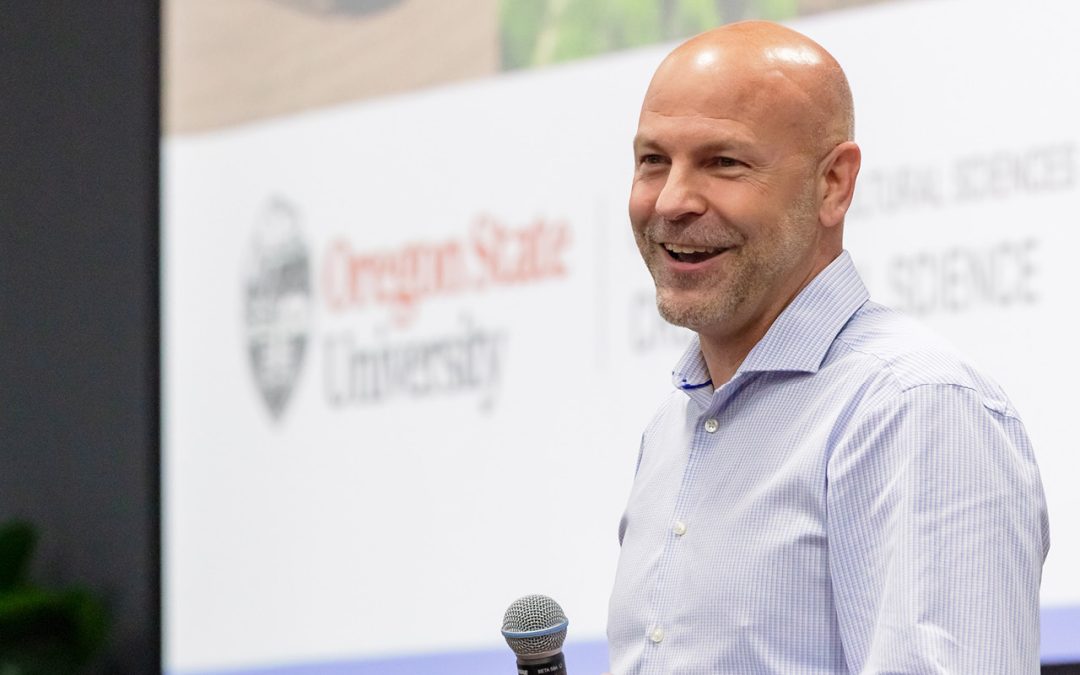As Director Of International Sales for Mountain View Seeds, Brett Freeborn has visited 40 countries, putting him in the box seat to identify global challenges and turf trends.
Brett said the major trend, especially in the northern hemisphere, was for retailers to switch from traditional cool season varieties to warm season varieties.
This was being driven by more frequent extreme weather events, particularly heat waves and drought, and the combination of population growth in major cities and water restrictions.
Brett said these changes were challenging for golf course and sports field managers as well as turf producers. Even golf courses that had converted to Bermudagrass were looking for ways to further cut water consumption.
“How they’re trying to solve the problem is that they’re trying to switch to Zoysia,” he said of one course near Phoenix, Arizona.
“They think it will use less water, they think it will stay cleaner, longer. They think it’ll wake up earlier in the spring. And so then for a month and a half, two months maybe, they’ll just go and use pigment spray. That’s how they’re going to try and adapt, overcome the challenges.”
Brett said records showed the UK and Europe also were getting hotter. Typical British soccer fields of Perennial Ryegrass were struggling to cope with warmer spring and summer conditions and the grounds keepers were asking for cold tolerant, warm season varieties.
Another challenge was looming restrictions on chemicals being pushed by the European Union and its Farm to Fork Strategy requiring a 50 per cent reduction in the use and risk of chemicals by 2030.
The strategy doesn’t just impact food producers. Turf growers, buyers and managers will be affected by its ban on the use of more hazardous chemicals in sensitive areas, defined as “an area used by the general public, such as a park or garden, recreation or sports grounds, or a public path”.
Brett said turf breeding programs were focused on solving these challenges by developing new varieties with a range of traits, from colour to drought tolerance, cold tolerance in warm season varieties, higher turf density and better quality and recovery which helps suppress weeds and reduces the need for herbicides.
“Northern Europe lost a lot of their tools earlier than other places,” he said. “They don’t have the chemicals to fight it. So what they’ve been doing is breeding lighter and lighter Tall Fescue and Perennial Ryegrass so the poa annua will blend in with it, so it doesn’t look completely horrible.”

Brett said Mountain View Seeds, through its research arm MVP Genetics, also was working on lighter-coloured varieties to fill that niche.
“We’re trying to breed varieties that use less water, so they recover quicker after drought,” he said. “If it survives under snow and recovers, it means that it stays green longer into the autumn. It also means that it’s probably going to go and wake up earlier in the spring. So you’ve got a grass that’s more competitive for a lot longer duration in the year.”
The MVP Genetics variety IronCutter™, which was brought to Australia by TurfBreed, has shown great results in trials during winter, surviving minus 23 degrees Celsius in Missouri, and is being tested at New York’s Central Park and the Washington Monument, in Washington DC.
Brett said another variety, Gateway Zoysia, which went into Australian quarantine in May, also had withstood “some pretty severe elements”, including minus 10 degrees Celsius in Oregon during the past five years.
Independent data proves varieties are better
The National Turfgrass Evaluation Program, which develops and coordinates uniform evaluation trials of turfgrass varieties and experimental selections in the United States and Canada, has been crucial to the company’s success. Mountain View Seeds also has more than a dozen varieties that have been approved by the Alliance for Low Input Sustainable Turf, known as A-List. The A-List is an independent, non-profit industry initiative, fostering the development of sustainable turfgrass varieties.
Under A-List, Brett said five universities evaluated independent trials of both warm and cool season grasses at a range of inputs.
Unlike some companies that claimed their varieties used 50 per cent or 60 per cent less water, “we have scientific data to prove that our products are better”.
As well as lower production costs for growers, Brett said these varieties offered the potential for a higher sale price and better margins.

Customers had suggested they should charge a premium for those varieties that reflected their value and separated them from the competition.
“We don’t always have to be driven by price to sell products,” he said.
“If we can scientifically prove that we’ve got value, we can go and extract that out of the marketplace.”
Brett said he was impressed by the depth of research trials carried out by TurfBreed to understand how IronCutter™ would perform in Australia, covering topics such as thatch accumulation, establishment, persistence, how long it will stay green and best practice management.
He also praised TurfBreed’s variety fact sheets for clearly and simply presenting complex information to customers.
“We can take it to our end customers, we can take it to the golf courses, we can take it to sod farms, anybody that wants to look at it, it’s awesome information,” he said.
“I’ve gone back to our company and said we need to raise the bar … we want to emulate it.”
About Mountain View Seeds
Mountain View Seeds produces more than 36,000 tonnes – half the world’s supply – of cool season grass seed in the Willamette Valley of Oregon, in the northwestern United States.
This includes more than 80 varieties of grasses such as transitional Ryegrass, Fine Fescue, Tall Fescue, Creeping Bentgrass and Rough Bluegrass.
All up the company’s 250 growers produce seed for 28 crops and 150 varieties across more than 24,000 hectares.
MVP Genetics was formed in 2018 to manage research and licensing of vegetative grass varieties, including IronCutter™ hybrid Bermudagrass and Gateway Zoysia.

